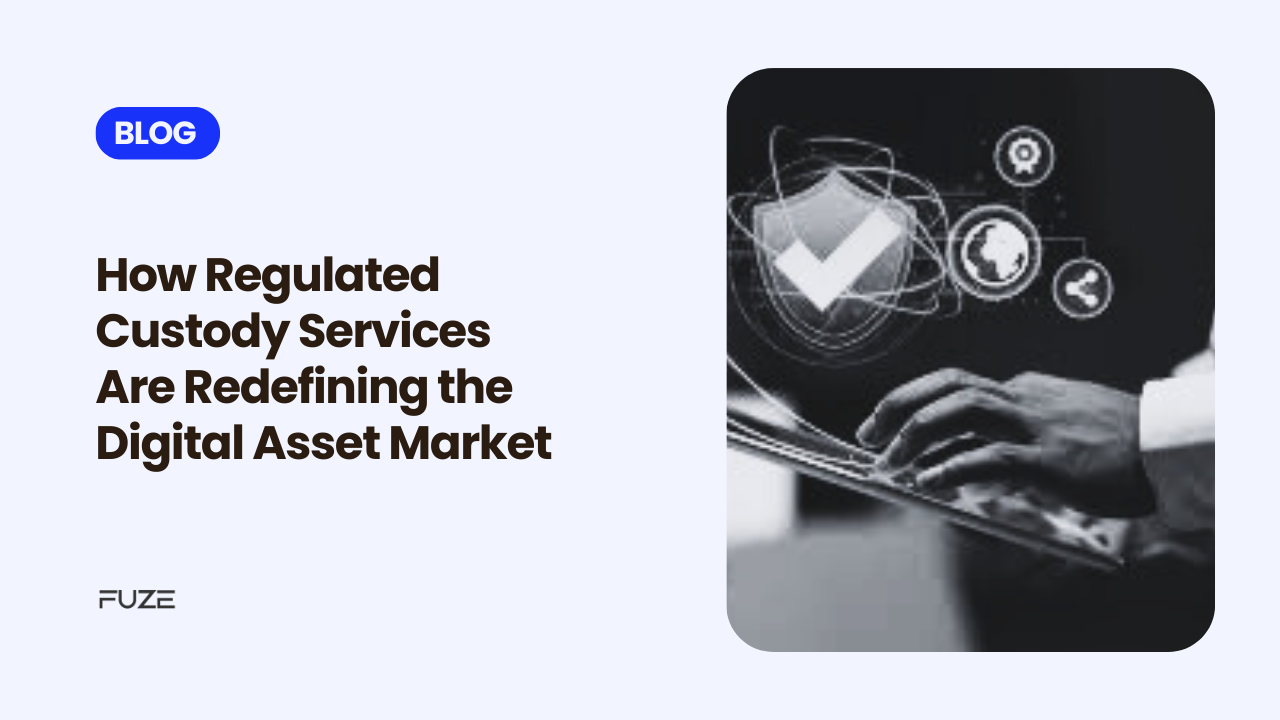Digital assets are evolving at an unprecedented pace. As more and more people seek out secure, reliable, and regulated custody solutions for their Bitcoin, Ethereum, and even newer tokens, custodial services continue to seize the spotlight. So, what are regulated custody services, and how are they redone to reshape the digital asset market? This blog looks into the main aspects of regulated custody services, their relevance in the current financial scenario, and how it changes the way institutions and individuals interact with digital assets.
What Are Regulated Custody Services
Regulated custody services are financial services that keep digital assets secure on your behalf, making it safe for investment while adhering to regulatory standards. These services come from institutions whose activities are guided by financial authorities and regulators for security, risk management, and customer protection.
Traditional custodians like banks, give similar services for physical assets, cash, securities, and commodities. However, because of their relatively new and mainly unregulated status in some jurisdictions, digital assets require specialized custodians with deep knowledge and experience in blockchain technology, encryption, and secure storage methods.
Regulated custody services combine the traditional custodial framework with modern digital asset solutions to help investors gain access to safe and compliant means of storing digital holdings.
Why Are Regulated Custody Services Important
Security and Protection of Assets: Digital assets are always prime targets for hackers because they hold value and their transactions are entirely digital. In the absence of proper security, an investor’s holdings may get stolen or lost. A regulated custodian would reduce such risks by employing standard security measures of the industry like multi-signature wallets, cold storage, and encryption. These services offer a boost of security that most individual investors or small institutions cannot afford to implement themselves.
Regulatory Compliance and Legal Assurance: The most significant difference between a regulated custodian and an unregulated one is regulatory compliance. Investors are assured that the custody provider adheres to established financial and security regulations, such as anti-money laundering (AML) and know-your-customer (KYC) protocols.
For institutions, regulated custodians ensure that they are not doing anything illegal and, therefore, do not face risks of financial penalties and reputational damage. In a world where governments around the globe are getting stricter with regulations on digital assets, selecting a regulated custodian provides legal certainty and reduces exposure to non-compliance risks.
Institutional Adoption of Digital Assets: One of the most significant barriers to institutional adoption has been the unavailability of safe and regulated custody solutions. In fact, institutional investors, which include pension funds, insurance companies, and hedge funds, often require robust custody solutions to invest confidently in the digital asset market.
Regulated custodians offer the infrastructure and compliance necessary to meet institutional standards, which is why many institutional players are increasingly relying on these services. As regulated custodians become more prevalent, institutional interest in digital assets is expected to rise, driving further growth in the market.
Insurance Coverage: Many regulated custodians also offer insurance cover for digital assets. This provides yet another layer of security: coverage in case of theft, hacking, or other security breaches. Insurance in place thus raises investor comfort, especially for those institutional investors who have to meet particular risk-management requirements.
The insurance coverage provided by regulated custodians ensures that the assets are protected under similar terms as traditional financial instruments, thus making digital assets more attractive to institutional investors who are keen on security and risk mitigation.
Increased Liquidity and Accessibility: Regulated custody services also play a role in enhancing the liquidity of digital assets. With reliable and compliant custody solutions, institutions and investors can freely trade assets without worrying about the security and availability of their holdings. This creates a more accessible market, where institutions can trade digital assets on regulated exchanges, improving liquidity across the board.
Furthermore, regulated custodians provide easy access to fiat-to-crypto onramps, making it easier for individuals and institutions to buy, sell, and store digital assets in a compliant manner.
How Are Regulated Custody Services Reshaping the Digital Asset Market
Building Trust with Institutional Investors
The introduction of regulated custody services has been a key driver in building trust within the digital asset market. For many years, digital assets were associated with high volatility, risk, and uncertainty. However, with regulated custodians offering secure storage and compliance with local laws, institutional investors are beginning to view the market with more confidence.
For institutional investors, regulatory compliance is non-negotiable. By providing services that comply with established regulations, regulated custodians are paving the way for larger financial institutions to enter the market, increasing institutional participation and mainstream adoption of digital assets.
Increased Market Maturity
Regulated custodians bring professionalism and structure to a market that was once seen as chaotic and speculative. By following strict regulations and offering transparent services, these custodians are helping the digital asset market mature.
With regulatory oversight and clear standards in place, the market is evolving into a more stable, reliable, and predictable space. This maturation makes the market more appealing to long-term investors, including individuals and institutions that seek safe, well-regulated investment opportunities.
Enabling Institutional Products and Services
As the digital asset market becomes increasingly institutionalized, regulated custodians play a central role in enabling new products and services. For instance, cryptocurrency-backed ETFs, institutional trading desks, and derivatives markets all rely on regulated custodians that ensure secure storage and management of assets involved in these products.
These services facilitate regulated custodians in helping digital assets become an integral part of traditional financial products, which may be traded and held alongside other assets like stocks and bonds.
Promotion of Global Adoption and Regulatory Clarity
Regulated custodians help standardize cross-border digital asset custody practices. As digital assets are traded worldwide, custodians that are compliant with international regulatory standards will promote wider adoption and a clearer regulatory framework for cross-border transactions.
Clear regulation is a prime requirement for the global expansion of the digital asset market. As more countries bring in clear laws and frameworks for digital assets, the market will become even more open for international investors and institutions.
Innovation in the Digital Asset Ecosystem
The growth of regulated custodial services is also encouraging innovation within the digital asset space. As the market matures and the regulatory environment strengthens, companies are developing new and advanced custodial solutions that cater to a variety of use cases. This includes custody for various types of digital assets, such as non-fungible tokens (NFTs), security tokens, and stablecoins, as well as integration with decentralized finance (DeFi) platforms.
These innovations lead to broader conceptions of what is possible within the digital asset market, from providing secure custody solutions for a wider array of digital assets to improving the overall user experience of individual and institutional investors.
The Future of Regulated Custody Services
As the digital asset market continues to evolve, the role of regulated custody services will only become more significant. Their ability to offer security, regulatory compliance, and institutional-grade services will be essential in attracting larger players to the space and encouraging mainstream adoption of digital assets.
Moving forward, regulated custodians are going to fill the gap between traditional finance and the digital asset world. The service they provide is going to keep evolving with a growing demand for secure, efficient, and compliant ways of managing digital assets that open up more channels for digital assets into the global financial system.
Conclusion
Regulated custody services are not just reshaping the digital asset market; they help legitimize and mature it. They provide security, regulatory compliance, insurance coverage, and access, which could be the bases for greater institutional involvement and the mainstream acceptance of digital assets.
As more institutions, investors, and regulators embrace the benefits of regulated custodial solutions, the digital asset market is likely to experience increased growth, trust, and innovation, unlocking new opportunities for the global financial ecosystem.
Disclaimer: Virtual assets carry significant risks, including high volatility and potential loss of your entire investment. They are not backed by governmental protections, and recourse may be limited in case of loss. Always assess your risk tolerance, fully understand the risks, and seek independent financial advice if needed before investing.
Frequently Asked Questions
- How do regulated custody services contribute to market transparency and integrity?
By adhering to strict regulatory frameworks and offering transparent reporting, regulated custodians help create a more trustworthy market. They provide institutional-grade infrastructure that ensures asset protection, compliance, and secure transactions, contributing to market integrity.
- Are regulated custody services available for all types of digital assets?
Yes, regulated custodians are expanding their services to cover a wide range of digital assets, including cryptocurrencies like Bitcoin and Ethereum, as well as newer assets like security tokens, NFTs (non-fungible tokens), and stablecoins.
- How do regulated custody services impact the overall growth of the digital asset market?
These services promote broader adoption of digital assets by providing secure, compliant storage solutions that attract institutional investors, regulatory clarity, and a more professional environment, thus fostering the growth and maturation of the digital asset market.
- Can regulated custodians offer services to both individuals and institutions?
Yes, regulated custodians cater to both individuals and institutional investors. They provide tailored services that meet the needs of institutional clients, such as portfolio management, while offering user-friendly solutions for individual investors looking to store digital assets securely.
- How do regulated custody services ensure compliance with global regulations?
Regulated custodians comply with local and international regulations, including AML, KYC, and other financial laws, ensuring that digital assets are stored and managed according to the rules. They often work with regulatory bodies to ensure their operations meet global compliance standards.







